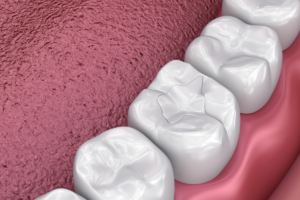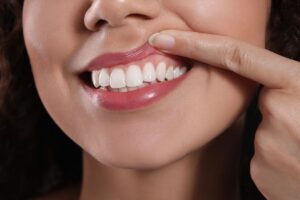Whenever you walk down your dental hygiene aisle at your local supermarket, don’t you feel overwhelmed with the abundance of toothpaste choices so readily available? There are so many options, so how can you decide on the right toothpaste for your oral hygiene? The dental implants specialist in Orange County tells us that when shopping for our next tube of toothpaste, we should keep our eyes wide open for the American Dental Association (ADA) Seal of Acceptance. This signifies that the ADA has graded the toothpaste for safety and efficacy.
What’s more, which toothpaste you settle with depends on your personal dental needs. Believe it or not, toothpaste isn’t a modern-day concept. Archaeologists can confirm that ancient Egyptians cleaned their teeth with a mixture of ox-hoof ashes, sand, and burnt eggshells as far back as 5,000 B.C.
Following that, the dental implants specialist in Orange County tells us that the Romans use a blend of oyster shells and crushed ox bones, powdered charcoal, and crushed tree bark. And in more recent times, the 1700s, the English were using brick dust and crushed china to achieve a cleaner and brighter smile.
Here the staff at the dental implants clinic in Mission Viejo give us a heads up on the best and some of the worst ingredients in toothpaste.
Fluoride
Many of us know that fluoride is the main cavity-fighting ingredient in toothpaste, which is responsible for strengthening enamel and preventing tooth decay. Holistic dentists at dental implants Orange County confirm that every tube of toothpaste with the ADA seal contains fluoride.
Fluoride is the cavity-fighting ingredient in toothpaste, which makes enamel more robust and prevents tooth decay. All tubes of toothpaste with the ADA seal contain fluoride.
There are two types of fluoride commonly found in dental products:
- Sodium fluoride, which puts a stop to tooth decay and is the more common of the two.
- Stannous fluoride, which also prevents tooth decay as well as gingivitis and minimizes tooth sensitivity. Although stannous fluoride stains teeth, researchers have stabilized it, so staining is now an obsolete problem.
In a 2019 study, researchers compared adults in China who cleaned their teeth with stannous fluoride toothpaste and those who washed their teeth with sodium fluoride toothpaste. Both groups witnessed improvement in plaque control and gum inflammation after three and six months, but the stannous fluoride group saw better improvement.
People walk on eggshells when they even hear the word fluoride because they have some apprehensions about safety. Some holistic dentists advise their patients to use toothpaste with fluoride if they feel the patient has a high risk of tooth decay.
The apprehension about fluoride comes from the inaccuracy about the safety of fluoridated water, says Edmond Hewlett, DDS, professor and associate dean for equity, diversity, and inclusion at the UCLA School of Dentistry, and an ADA consumer advisor.
The ADA advocates that fluoride is safe in drinking water and toothpaste, and the American Association of Pediatrics stands by fluoride in drinking water and toothpaste in age-appropriate quantities. Children’s toothpaste typically has less fluoride than adult toothpaste.
International Academy of Oral Medicine and Toxicology (IAOMT) is concerned about the many sources of fluoride and health risks from this exposure. IAOMT agrees that scientific research shows that exposure to fluoride could impact nearly every part of the human body, potentially being harmful to us.
Potassium Nitrate
Those with sensitive teeth should get a toothpaste with potassium nitrate, an ingredient that lowers tooth sensitivity. To gain results, you have to use this type of toothpaste regularly. If you brush at least twice a day, it can take weeks to notice any changes. The reason being is that the only advantage of potassium nitrate is cutting down the sensitivity, and this is not something everyone needs.
Zinc Citrate
Zinc citrate eliminates the accumulation of plaque, a sticky film covering the teeth which has bacteria. When plaque soaks up calcium from your saliva, it converts into tartar, which has to be scraped off. Other ingredients also lower plaque, but zinc citrate is one of the most popular.
Calcium Carbonate
Calcium carbonate is one of the various abrasive agents that help cleanse teeth and get rid of stains. Calcium carbonate is a mild stain remover and can be used safely with careful brushing. A 2019 study in Japan concluded that toothpaste with calcium carbonate removes more plaque than toothpaste without it. Also, the study established calcium carbonate did not damage gum tissue.
Hydrogen Peroxide
Some toothpaste includes hydrogen peroxide because it can reduce stains. A 2020 study compared toothpaste with two different concentrations of hydrogen peroxide found the higher concentration lessened stains more than the lower concentration. Nevertheless, higher concentrations, such as those in a hydrogen peroxide bottle can harm your enamel.
Toothpaste with hydrogen peroxide includes tiny amounts of it, somewhat less than bottled hydrogen peroxide, so it doesn’t ruin enamel.
Toothpaste Ingredients You Should Stay Away From
Still, not everything in your tube of favorite toothpaste is good for your teeth. They could be too abrasive, which wears down the enamel. So, dentists recommend you choose one with the ADA seal, which helps you stay rest assured that it has been screened for abrasives that could harm your teeth.
- Sodium lauryl sulfate. Some toothpaste includes sodium lauryl sulfate, which produces a foaming action to clean teeth. However, for some individuals, it causes mouth sores, swelling, redness, and peeling.
- Activated charcoal. Even though this has become a common ingredient in toothpaste because it claims to have whitening effects, it is very abrasive and can damage your enamel.
The holistic dentists at Aria Dental in Orange County or Mission Viejo understand that choosing a toothpaste can be confusing. As being certified and accredited member of IAOMT, we practice fluoride-free dentistry. It is also to keep a regular regime of brushing and flossing. Make sure to make regular dentist appointments. Contact Aria Dental at (949) 364-9600 to set up your next holistic dental visit. We are your trusted holistic dental provider, offering safe, non-toxic alternatives for every dental procedure. We are also a top certified member of IAOMT (International Academy of Oral Medicine & Toxicology), IABDM (International Academy of Biological Dentistry & Medicine), and HDA (Holistic Dental Association).



















